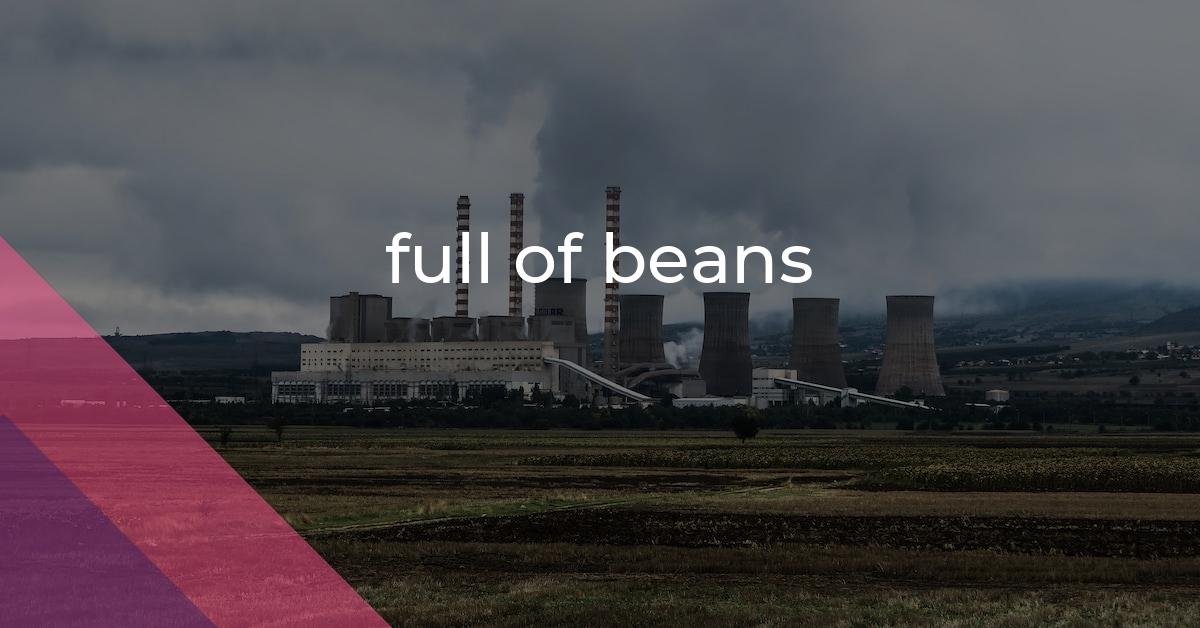full of beans: Idiom Meaning and Origin
What does ‘full of beans’ mean?
The idiom "full of beans" means to be full of energy, enthusiasm, or excitement.

Idiom Explorer
The idiom "vim and vigor" means having energy, enthusiasm, and vitality. It is often used to describe someone who is lively, vigorous, and full of vitality.
The idiom "know beans about" means to have little or no knowledge about a particular subject or topic.
The idiom "in full gear" means to be operating at maximum speed or efficiency, with all resources and effort fully engaged.
The idiom *in full force* means that something is happening or being done with great intensity, energy, or effectiveness.
The idiom "full to the gills" means completely or excessively full, often referring to a person or a container that is completely filled to its capacity.
The idiom "full tilt boogie" means to go at maximum speed or effort, often used to describe a situation or activity that is intense, fast-paced, or energetic.
The idiom "full speed ahead" means to proceed or move forward with great speed or intensity, without hesitation or obstacles. It conveys a sense of determination and focus in pursuing a goal or task.
The idiom "full of piss and vinegar" is used to describe someone who is energetic, full of enthusiasm, and ready to take on challenges. It is often used to refer to young people who have a lot of energy and a rebellious attitude.
Spilling Exuberance
The idiom "full of beans" is primarily used in American English and has a figurative meaning. It is often used to describe a person who is energetic, enthusiastic, or lively. This idiomatic phrase suggests that the subject is full of energy or vitality, akin to being as lively as a bag of beans.
The exact origins of this idiom are unclear, as different theories exist, but there are a few possibilities that have been proposed. One theory suggests that the idiom may have originated from a literal interpretation, where beans are associated with being nutritious and provide sustenance. In this sense, someone who is "full of beans" could be seen as being well-fed and therefore full of energy.
Another theory suggests that the phrase may have been derived from the idea that beans, when cooked, expand and become bigger. Therefore, someone who is "full of beans" would be considered to have an abundance of energy or enthusiasm.
One related idiom that can be used in conjunction with "full of beans" is "bundle of energy". Both idioms convey the idea of someone being energetic and enthusiastic. While "full of beans" emphasizes the energy and vitality aspect, "bundle of energy" adds to it by implying that the person is bursting with energy, much like a tightly wrapped bundle ready to burst open.
It is also worth noting that the idiom "full of beans" is not a recent coinage. Its usage can be traced back to the early 1900s, and it continues to be used in contemporary American English. This longevity indicates that the idiom has stood the test of time and remains a common expression in the language.
The idiom "full of beans" can also be related to the phrase "full of piss and vinegar". While "full of beans" implies energy and liveliness, "full of piss and vinegar" adds a level of aggressiveness or feistiness to it. It suggests that the person is not only full of energy but also ready to take action or confront challenges with vigor.
Another related idiom is "full blast". While "full of beans" emphasizes energy and enthusiasm, "full blast" adds a sense of intensity and maximum effort. It suggests that the person is not just energetic but is going all out and giving their all in whatever they are doing.
The idiom "full of beans" can also be related to the phrase "in full force". While "full of beans" conveys the idea of someone being energetic and lively, "in full force" suggests that the person is not only energetic but also exerting their energy to the fullest extent. It emphasizes that the person is fully engaged and actively involved in a particular activity or endeavor.
One more related idiom that can be connected to "full of beans" is "full of oneself". While "full of beans" refers to someone being energetic and lively, "full of oneself" implies that the person is overly self-assured or self-centered. It suggests that the person is not only energetic but also excessively confident or self-important.
It is important to understand that the idiom "full of beans" is context-dependent, and its meaning can vary depending on the situation and the speaker's intent. While it often carries positive connotations, suggesting a lively or energetic individual, it can also be used in a negative or sarcastic manner to imply that someone is being overly enthusiastic or talkative.
The idiom "full of beans" is an established phrase in American English that describes a person who is lively, energetic, or enthusiastic. Although the exact origins of the idiom are uncertain, it has been in use for over a century and continues to be a popular expression. The figurative nature of the idiom allows for a range of interpretations depending on the context. While it generally carries a positive connotation, it can also be used sarcastically. The idiom's enduring presence in the language attests to its significance and continued relevance in contemporary communication.
Example usage
Examples of how the idiom "full of beans" can be used in a sentence:
1. She's always full of beans in the morning, ready to tackle the day.
2. The children were full of beans after having a big sugary snack.
3. Despite his age, the old man was still full of beans and full of life.
More "Colloquial" idioms



